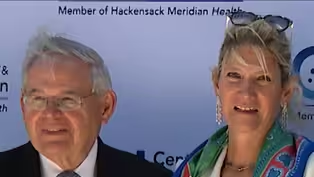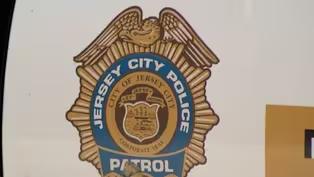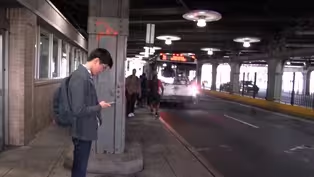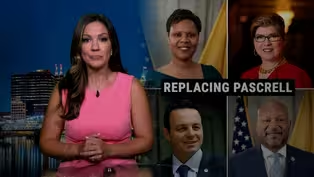NJ Spotlight News
AG explains new police guidelines for mental health calls
Clip: 8/26/2024 | 10m 11sVideo has Closed Captions
Rules are intended to 'slow and stabilize' encounters between police and barricaded people
Attorney General Matt Platkin is changing the state’s use of force policy and setting new guidelines for how police respond to certain mental health calls. The directive comes just weeks after the fatal police shooting of a Fort Lee woman who was barricaded in her apartment amid a mental health crisis.
Problems playing video? | Closed Captioning Feedback
Problems playing video? | Closed Captioning Feedback
NJ Spotlight News is a local public television program presented by THIRTEEN PBS
NJ Spotlight News
AG explains new police guidelines for mental health calls
Clip: 8/26/2024 | 10m 11sVideo has Closed Captions
Attorney General Matt Platkin is changing the state’s use of force policy and setting new guidelines for how police respond to certain mental health calls. The directive comes just weeks after the fatal police shooting of a Fort Lee woman who was barricaded in her apartment amid a mental health crisis.
Problems playing video? | Closed Captioning Feedback
How to Watch NJ Spotlight News
NJ Spotlight News is available to stream on pbs.org and the free PBS App, available on iPhone, Apple TV, Android TV, Android smartphones, Amazon Fire TV, Amazon Fire Tablet, Roku, Samsung Smart TV, and Vizio.
Providing Support for PBS.org
Learn Moreabout PBS online sponsorshipand an update tonight on another controversial issue facing law enforcement attorney general Matt platkin is changing the state's use of force policy setting new guidelines for how police respond to certain mental health calls the directive comes just weeks after the Fatal police shooting of a fortly woman who was barricaded in her apartment amid a mental health crisis the family of 25-year-old Victoria Lee called 911 for help but then repeatedly asked that police not come or enter the home the state says the new directive is intended to slow and stabilize encounters between police and barricaded people with changes slated to take effect as early as this October so what's in the new policy attorney general Matt platkin is with me now for more attorney general thanks for coming on to talk about this um this is as you put it the first Statewide policy of it kind and I'm wondering of course in light of some of the recent events Victoria Lee the 25-year-old woman from fortly if that had anything to do with the timing of putting out this new directive well first of all thank you for having me Briana uh I first announced that we were going to create this policy uh in 2023 when I took over the Patterson Police Department uh and it's not in a reaction to any one incident but what has been clear from our work overseeing the Fatal police encounter investigations as well as through our work through arrive together where we have the first in the country Statewide alternative response to incidents of mental health crises we have seen that if we provide Law Enforcement Officers the tools and resources that they need to do their job we don't ask them to do everything and be everything all at once that we can resolve these incidents safely peacefully that gets people the help they need and without injury either to the civilian involved or to the officer right which we know has been a problem police officers departments have have said that they were being asked to do too much is it a backdoor way though of getting more municipalities to participate with arrive together since you mentioned it because as it stands right now it's still a voluntary program well arrived together as of the end of last year became the first program in the country to be operational in every County in the State uh we are now serving well over half the state's population again a little over two years ago we started our first pilot program so we're now over 50% of the state's population has some form of an alternative crisis response program we do require and rely on the participation of our municipalities to be involved in arrive uh we do not have the authority to mandate that they do that and there are resource limitations in each community so when we expand arrive we tailor the program both to the resources that exist in that Community as well as to what the community wants to see from their alternative response program this program is a little bit different and it's Works through the County Prosecutors it is an expansion of arrive but the goal here is focused on a very limited subset of incidents when you have a barricaded subject which we know particularly when that barricaded individual has suffering from a mental health episode we know are the incidents that are most likely to result in force and tragically most likely result in an injury either to a civilian or to an officer and so then how is the state going to ensure that these towns will have access to these Mental Health Resources and also be able to provide the right type of training because as I read it um it looks like the mental health professionals will need to train at least quarterly with the police departments um how are you going to ensure that this mandate is is carried out that towns can actually do it well the good news is every County already has an arrive program so we already have agreements in place with mental health providers in every County and we're putting additional resources from our arrive together program and I'm grateful to Governor Murphy and the legislature who has been such strong supporters of that in order to help scale up the Mental Health Resources necessary in order to effectuate this policy but if it were not for the expansion of arrive over the past two years this policy which again is the first Statewide policy of its kind in the country incorporating mental health professionals into our our barricaded crisis response if it were not for the fact that we scaled up arrive we could not implement this program so we're both going to rely on existing resources that we've already put in place and we're putting new dollars to bear in order to bring new mental health Partnerships uh into onto the table so that we can bring a holistic response to a moment of Crisis right so when you talk about resources or ramping up arrive you mean money there's funding there because of that that towns can then tap into yes we funding uh the legislature and Governor Murphy has appropriated funding for arrive together and we're using a portion of that to implement this policy through the County Prosecutors offices and uh this make no mistake this policy which was created with the input of law enforcement professionals throughout New Jersey and throughout the country Mental Health Providers throughout New Jersey and the country Advocates Community organizations this policy will save lives let me ask you let me just tick through attorney general some of the other items in this directive which also includes having officers um wait uh before breaking down a barricade to wait until crisis negotiators are on the scene to bring less lethal weapons like tasers as an example um and to immediately involve a superior a supervisor on the scene were these if these were in place these specific guidelines do you think lives like nji C Brooks like Victoria Lee would have been saved well BR I can't comment on any particular case particularly cases that we are currently investigating and will present to the grand jury but what we have seen both in New Jersey and across the country New Jersey is not alone in this when we ask law enforcement to do everything when we do not put proper structures and resources in place then we do not achieve the outcomes in every instance that we hope we would and we have seen through the expansion of arrive many instances where we've had a barricade individual suffering from a mental health uh episode and thanks to the partnership with mental health providers thanks to the training and thanks to the uh work of law enforcement in those situations we've been able to resolve them peacefully and so we believe by putting these best practices into a directive by setting Statewide policy for how we want to respond to again a very limited subset of police interactions or we can resolve these safely we can resolve them peacefully we get people the help they need and ultimately we can save lives very quickly Before I Let You Go um prior to 2020 had been about a decade before use of force guidelines were updated since you have taken uh office there you have made quite a few changes is this something that you are looking to reform even further in 2020 we have thanks to the office of public integrity and accountability uh under then attorney general guier greywall our department in the state underwent uh the first comprehensive review of our use of force policy in in the early two decades as you mentioned and that policy is now used as a model across the country uh and we are constantly working and listening to law enforcement to community stakeholders to Mental Health Providers to other Advocates and if we can improve it in a way that is clear that law enforcement can be trained on that sets clear guidelines for them then we will do so um our goal is not to keep constantly tinkering it with it but when we see a way to improve policies again that makes law enforcement do their job even better that keeps people safer that keeps our officers safer that's what we're going to do is there a world in which law enforcement doesn't arrive to these situations you know as well as I do that's been one of the um items that have come up during these protests that it should be left to community groups trained Community groups and out of the hands of of law enforcement well we're already doing that in some situations first we're implementing the community crisis response team legislation uh that was passed earlier this year and we are doing that in tandem uh with our arve together through an office that I stood up the first office of its kind in the country called the office of alternative and Community response dedicated to Alternative responses to incidents of Crisis we're doing it through the arriv together program in cities like Patterson and norc where we're training dispatchers to identify calls that do not require a law enforcement response and so we're already doing that but look we have a shortage of mental health professionals in New Jersey and across the this country and there are still going to be calls that involved potentially armed or dangerous individuals that require some component of a law enforcement response you will never get a social worker or a mental health provider to show up on a scene when a person is arms sit with a gun by themselves you're just not going to find providers to do that and so and nor would it be safe frankly to let them do that so what we want to do is in those limited subset of calls that still require a law enforcement response then we want to make sure the rules of the road are set in a way that enacts best practices that incorporates mental health and Community response teams which by the way are in this policy as well directly into that response that gives family members a role and that makes sure we're taking a holistic approach that ultimately can resolve these situations peacefully uh but if if the question is are we open to non-law enforcement response to a certain subset of calls absolutely and we are doing that and we are implementing that as we speak attorney general Matt thanks so much we appreciate it thank you for having me [Music]
Bob Menendez's wife gets her next court date
Video has Closed Captions
Clip: 8/26/2024 | 1m 8s | Nadine Menendez's trial was delayed due to her breast cancer diagnosis (1m 8s)
Fraud prevention strategies highlighted at AARP summit
Video has Closed Captions
Clip: 8/26/2024 | 4m 26s | Attorney General Matt Platkin details ways to identify a scam (4m 26s)
Jersey City face fines if police who used weed not rehired
Video has Closed Captions
Clip: 8/26/2024 | 1m 15s | The deadline to reinstate two officers is the end of this week (1m 15s)
Passengers savor brief NJ Transit fare holiday
Video has Closed Captions
Clip: 8/26/2024 | 4m 11s | The fare holiday will cost NJ Transit an estimated $19 million (4m 11s)
Paterson Mayor Sayegh joins race to succeed Rep. Pascrell
Video has Closed Captions
Clip: 8/26/2024 | 1m 9s | Sen. Nellie Pou seems to be a front-runner in the race (1m 9s)
Providing Support for PBS.org
Learn Moreabout PBS online sponsorshipSupport for PBS provided by:
NJ Spotlight News is a local public television program presented by THIRTEEN PBS
















